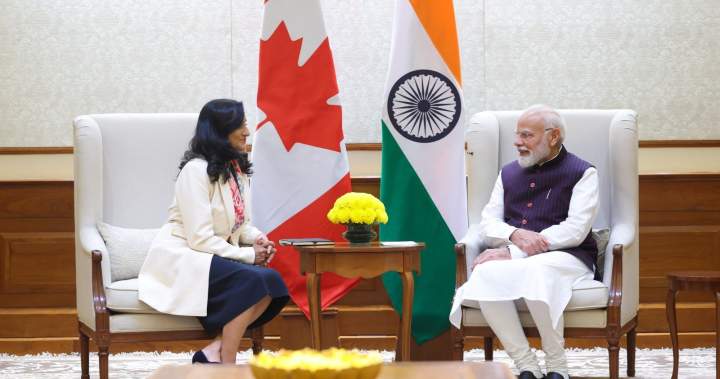Conversations intercepted by Canada and the United Kingdom implicate high-level Indian officials in the assassination of a B.C. Sikh leader, Global News has confirmed.
British intelligence provided Canada with the initial tip that it had picked up communications tying India’s government to the 2023 shooting death of Hardeep Singh Nijjar.
Canadian authorities later obtained their own intercept corroborating the involvement of Indian officials, among them Prime Minister Narendra Modi’s right-hand man, Amit Shah.
The monitored conversations, together with other evidence, explain why Ottawa accuses New Delhi of orchestrating the murder of the Canadian-Sikh activist, even as India denies any role.
The British High Commission declined to discuss the matter. “It is the U.K.’s long-standing position that we do not comment on intelligence matters,” a spokesperson said on Thursday.
The Indian High Commission in Ottawa did not respond to questions.
The intercepts would be “strong evidence,” since they come from the Five Eyes intelligence partnership between Canada, the U.K., U.S., Australia and New Zealand, said Dan Stanton, a former senior Canadian Security Intelligence Service officer.
“This is the gold standard of alliances,” said Stanton, who is writing a book on transnational repression. “It has a lot of weight. Then you bring in some corroboration from Canadian intelligence as well.”
Bloomberg first reported on the intercepted communications on Wednesday. Global News confirmed the veracity of the news report and obtained additional details about Canada’s role.
They come at an awkward time for Prime Minister Mark Carney, who has been making amends with the Modi government and pushing for a trade agreement with the South Asian nation.
Canada has invited India’s Minister for External Affairs, Subrahmanyam Jaishankar, to attend a meeting of G7 foreign ministers in the Niagara region on Nov. 11 and 12 .
The World Sikh Organization of Canada said it was troubled by Carney’s rapprochement with India while it continues to deny evidence of its role in killings in Western countries.
“The inability or refusal to hold India accountable is a betrayal of Sikh Canadians and of Canada’s own sovereignty and rule of law,” said the WSO spokesperson Balpreet Singh.
“The Carney government’s attempts to rebuild ties with New Delhi are deeply troubling while India continues to target Sikh activists on Canadian soil,” Singh said in a statement to Global News.
India has long complained that Ottawa has been too permissive of the Canada-based Khalistan movement that seeks independence for India’s Sikh-majority Punjab.

Get daily National news
Get the day’s top news, political, economic, and current affairs headlines, delivered to your inbox once a day.
While India has labelled pro-Khalistan campaigners as terrorists, Canada has countered that only a “small number” are involved in extremism and others are peaceful activists.
A leading proponent for Khalistan, Nijjar was leaving the Guru Nanak Sikh Temple south of Vancouver on June 18, 2023, when he was gunned down.
The following month, Bloomberg reported, the U.K.’s Government Communications Headquarters advised Canada it had detected communications it believed involved suspects working for the Indian government, about plans to kill Nijjar and two Sikh activists in the U.S. and U.K.
“The document didn’t name the people whose conversations had been tapped or Nijjar’s assassins, but the implication was clear to the analysts: There was a strong chance he’d been murdered in an operation directed by the Indian state,” the Bloomberg report said.
“Over the next several days, Canadian security agencies corroborated the initial intelligence. They also received another British wiretap, this one capturing a conversation referring to how Nijjar had been successfully eliminated.”
Four accused hitmen, alleged associates of India’s Lawrence Bishnoi gang who were in Canada on temporary visas, were arrested last year in Edmonton and Brampton, Ont., and are awaiting trial.
Canada has alleged the Indian government was behind the killing, and has been using the Bishnoi gang to conduct shootings, extortions and other crimes against the South Asian community.
Days after Nijjar’s killing, the FBI announced it had disrupted a second murder plot, this one targeting one of Nijjar’s associates, Gurpatwant Singh Pannun, a New York-based pro-Khalistan activist.
The U.S. plot was traced to the Research and Analysis Wing, the intelligence arm that reports to Modi’s office. RAW officer Vikash Yadav allegedly hired an Indian crime figure to kill Pannun, but also mentioned three targets in Canada.
Then prime minister Justin Trudeau went public with India’s suspected role in Nijjar’s killing in September 2023, calling the murder of a Canadian citizen on Canadian soil an “unacceptable violation of our sovereignty.”
Last October, the RCMP announced a much broader series of crimes had also been “orchestrated by agents of the government of India.” Canada subsequently expelled six Indian diplomats who were persons of interest in the RCMP investigations.
Since taking office in March, however, Carney has adopted a more conciliatory approach to India as he seeks new commercial partners in Europe and Asia amid the White House’s trade war against Canada.
Carney invited Modi to the G7 summit in Alberta in June, and Foreign Affairs Minister Anita Anand followed up in August by announcing that Canada and India were restoring ties and appointing new high commissioners.
Anand met with her Indian counterpart in New Delhi in October and stated they had “reached consensus on a New Roadmap for Canada-India relations.” India has now invited Carney to New Delhi.
The Canadian Security Intelligence Service declined to comment.
Stewart.Bell@globalnews.ca
Read the full article here

